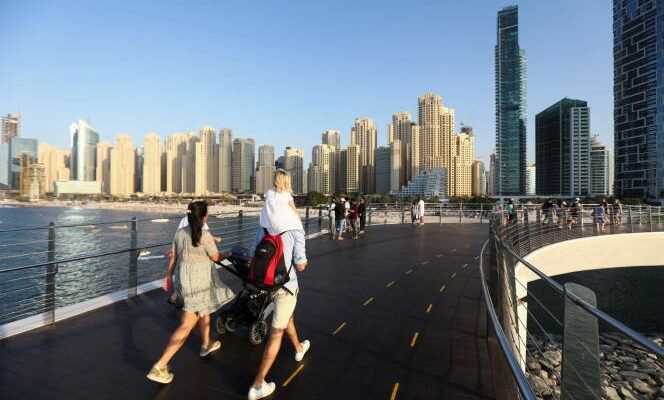Is this the end of an era? The arrogant, wasting Dubai saying goodbye to super-carbon mobility? Would one of the most opulent pearls of the wealthy United Arab Emirates be tempted by a new sobriety of transport? The magic kingdom, where we sprinkle the sand with oil to grow buildings and expressways, has it finished with excess? At first glance, this is not what strikes the visitor. The Burj Khalifa, the tallest tower in the world, is still there, towering over the heat-hazy horizon, as is the largest shopping center on the planet, the ski slope operating at 50 ° C in summer or the twelve-lane highways.
However, at least when it comes to transport, something is definitely changing. It’s the little details that signal it. A few scooters and shared bikes crossed on the sidewalks, recommendations for visitors to the Dubai 2020 Universal Exhibition to get there by metro rather than by 4 x 4 …
New doctrine
Authoritarian regime requires, the inflection towards alternative mobility comes first from above, and in particular from the all-powerful transport organizing authority of the Emirate, the Roads & Transport Authority (RTA). Its inalienable boss, Mattar Mohammed Al-Tayer, Chairman and CEO, presented his transport strategy at the end of November. The Dubai 2040 plan highlights the concept of “ city in twenty minutes, where 55% of the population will live within 800 meters of metro stations, which will make 80% of daily services accessible on foot, by bike and via other modes of soft mobility. “, says Al-Tayer.
Direction the Marina, an outlying district of the city, showcase of this new doctrine that repaints Dubai in “World leader in fluid and sustainable mobility”. This lakeside city covered with buildings, a residential area for many expatriates, is connected to the metro and served by the only tram line in the Emirates. It offers, at the level of the wide canals, a vast pedestrian and cycling zone. “You can do everything there on foot or by bicycle”, explains a Frenchman who works at the tricolor pavilion of the Universal Exhibition.
The city is not suitable for long journeys on two wheels. It is crossed by almost impassable urban highways
A large number of shared bicycle stations can be found there with the Careem logo, a successful start-up from the Middle East, based in Dubai precisely, and of which RTA has made a major partner. Careem, whose core business is the VTC, from Pakistan to Morocco, was acquired by Uber in 2019. The company is experimenting in Dubai with new services: deliveries, a call center for shared taxis and bicycles.
You have 62.12% of this article left to read. The rest is for subscribers only.
